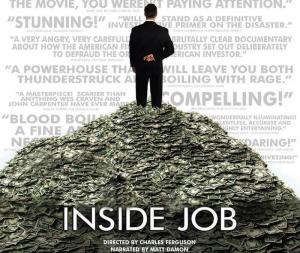This is an overview of the documentary Inside Job that was recently
shown on the BBC. As one interviewee commented regarding the path
Iceland had taken from 2000 onwards, “Nothing comes without
consequence.”
At the turn of the millennium Iceland was something of a picture
perfect capitalist country. It had low unemployment figures, low
government debt, clean energy programs, sustainable food production
programs, a good health care system and a good education system. Its GDP
was around $13billion. It was praised by many capitalist countries for
its development model and was seen as an example to be followed.
 However,
However,
in 2000 a program of deregulation was aggressively pursued that saw
Iceland shift towards the business practices prevalent in much of the
rest of the world. In 2008 Iceland went bankrupt. The financial sector
had made losses of $100b, over seven times the national GDP.
This is an overview of the documentary Inside Job that was recently
shown on the BBC. As one interviewee commented regarding the path
Iceland had taken from 2000 onwards, “Nothing comes without
consequence.”
The documentary itself is a cross examination of the financial crisis
of 2008. It goes into considerable depth to show what happened and how
it happened. The level of detail that this examination goes to is
commendable and well worth a watch for anyone who wishes to understand
what happened and, indeed, what is still happening. In many ways it is
like a book, there is so much information packed in that each time you
rewatch you pick up on something you missed before. It features a wide
array of interviewees who were present at the time, (and makes it clear
when certain persons under scrutiny declined an appearance) from whom
there are certainly some choice quotes, “When you think you can create
something from nothing it’s hard to resist”, and, “Massive private gains
out of public loss” are two that particularly stand out.
The content of the program traces through the crisis from the
historical roots of the policies of deregulation and the players
involved and moves on to show what these polices have led to: the idea
of financial institutions ‘too big to fail’. It shows explicitly the way
in which these financial institutes acted and how the drive for greater
accumulation of profit saw traditional responsibilities that kept the
system in check simply deemed irrelevant. In particular the analysis of
the growth of subprime mortgages and the bursting of the housing bubble
is particularly good (especially if you want to know what a credit
default swap actually is!).
It delves into the corruption involved in the crisis, from
highlighting the seemingly inexhaustible list of crimes the financial
companies were actually charged with prior to the crisis emerging, to
the more subtle one, how the subprime loan packages were able to
maintain a ‘triple A’ rating meaning they were considered perfectly
secure for companies and groups to invest in (particularly for some
retirement fund investments that could only be invested in AAA safe
investments).
The program puts all the facts on the table but, perhaps inevitably,
draws conclusions that are incorrect. The underlying theme of the
program hints (and sometimes explicitly states) that reform is the
answer needed to undo the crisis and get back to ‘the good old days’. It
highlights poor management of the major American motor and industrial
companies as reasons they fell behind “their foreign competitors.”
The truth is that in a capitalist mode of production anarchy rules,
this in turn led to a massive crisis of overproduction, there were
simply too many commodities being produced to be consumed as the
individuals could either not afford them or simply had no need for them.
From here the birth of credit comes into play. This merely expands the
system today at the expense of tomorrow. Only now tomorrow has arrived
and no one can pay. This way of thinking did not just extend to the
ordinary working people but was rife through the system that looked to
capitalise in the short term over any analysis of the long term.
Inside Job makes all of these points to some degree or another but
falls at the final hurdle. The program of deregulation, the growth of
finance capital, the expansion of credit to deal with overproduction,
were not accidents, or random paths that capitalism went down, nor the
whim of politicians with a wrong ideology. On the contrary they were the
only option for a system that is above all perpetuated by accumulation
of profit. There is no nice capitalism vs bad capitalism, there is only
capitalism and accumulation is how it functions. This is why the system
cannot be reformed to serve the needs of all and must be overthrown for
the furtherance of human society and history.
That said I would highly recommend the documentary which is well
worth a watch (or two just to get your head round the scope of
information!) as it gives a solid insight into the crisis. Bizarrely it
is also narrated by none other than Matt Damon. What more could you
want!






